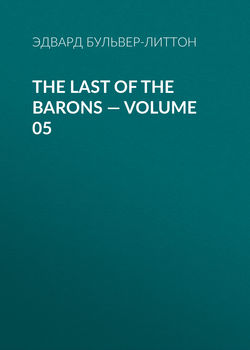The Last of the Barons — Volume 05

Реклама. ООО «ЛитРес», ИНН: 7719571260.
Оглавление
Эдвард Бульвер-Литтон. The Last of the Barons — Volume 05
BOOK V
CHAPTER I. RURAL ENGLAND IN THE MIDDLE AGES—NOBLE VISITORS SEEK THE CASTLE OF MIDDLEHAM
CHAPTER II. COUNCILS AND MUSINGS
CHAPTER III. THE SISTERS
CHAPTER IV. THE DESTRIER
Отрывок из книги
Autumn had succeeded to summer, winter to autumn, and the spring of 1468 was green in England, when a gallant cavalcade was seen slowly winding the ascent of a long and gradual hill, towards the decline of day. Different, indeed, from the aspect which that part of the country now presents was the landscape that lay around them, bathed in the smiles of the westering sun. In a valley to the left, a full view of which the steep road commanded (where now roars the din of trade through a thousand factories), lay a long, secluded village. The houses, if so they might be called, were constructed entirely of wood, and that of the more perishable kind,—willow, sallow, elm, and plum- tree. Not one could boast a chimney; but the smoke from the single fire in each, after duly darkening the atmosphere within, sent its surplusage lazily and fitfully through a circular aperture in the roof. In fact, there was long in the provinces a prejudice against chimneys! The smoke was considered good both for house and owner; the first it was supposed to season, and the last to guard "from rheums, catarrhs, and poses." [So worthy Hollinshed, Book II. c. 22.—"Then had we none but reredosses, and our heads did never ache. For as the smoke, in those days, was supposed to be a sufficient hardening for the timber of the house, so it was reputed a far better medicine to keep the goodman and his familie from the quacke, or pose, wherewith as then very few were oft acquainted."] Neither did one of these habitations boast the comfort of a glazed window, the substitute being lattice, or chequer-work,—even in the house of the franklin, which rose statelily above the rest, encompassed with barns and outsheds. And yet greatly should we err did we conceive that these deficiencies were an index to the general condition of the working class. Far better off was the labourer when employed, than now. Wages were enormously high, meat extremely low; [See Hallam: Middle Ages, Chap. xx. Part II. So also Hollinsbed, Book XI., c. 12, comments on the amazement of the Spaniards, in Queen Mary's time, when they saw "what large diet was used in these so homelie cottages," and reports one of the Spaniards to have said, "These English have their houses of sticks and dirt, but they fare commonlie so well as the king!"] and our motherland bountifully maintained her children.
In front of the cavalcade rode two, evidently of superior rank to the rest,—the one small and slight, with his long hair flowing over his shoulders; and the other, though still young, many years older, and indicating his clerical profession by the absence of all love-locks, compensated by a curled and glossy beard, trimmed with the greatest care. But the dress of the ecclesiastic was as little according to our modern notions of what beseems the Church as can well be conceived: his tunic and surcoat, of a rich amber, contrasted well with the clear darkness of his complexion; his piked shoes, or beakers, as they were called, turned up half-way to the knee; the buckles of his dress were of gold, inlaid with gems; and the housings of his horse, which was of great power, were edged with gold fringe. By the side of his steed walked a tall greyhound, upon which he ever and anon glanced with affection. Behind these rode two gentlemen, whose golden spurs announced knighthood; and then followed a long train of squires and pages, richly clad and accoutred, bearing generally the Nevile badge of the Bull; though interspersed amongst the retinue might be seen the grim Boar's head, which Richard of Gloucester, in right of his duchy, had assumed as his cognizance.
.....
"Thou forgettest that the Lady Isabel is dearly loved by Clarence, and that I would fain see removed all barrier to his nuptial bliss. But yonder rise the towers of Middleham. Beloved walls, which sheltered my childhood! and, by holy Paul, a noble pile, which would resist an army, or hold one."
While thus conversed the prince and the archbishop, the Earl of Warwick, musing and alone, slowly paced the lofty terrace that crested the battlements of his outer fortifications.
.....